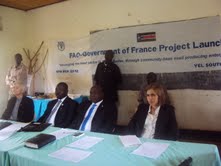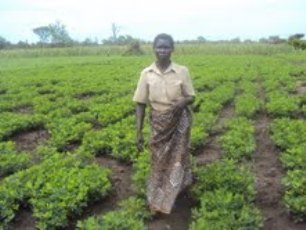Yei commissioner asks for support to maintain roads, boost food production
November 28, 2012 (YEI) – Yei County’s Commissioner, Juma David Augustine, appealed Wednesday for financial support to maintain roads in the area in order to boost food production.

Nearly two-thirds (60%) of South Sudanese “do not consume sufficient food that provides them a nutritious diet: they consume fewer than 2100 kcals per day and/or survive on food items from fewer than four different food groups. Warrap, Lakes and Northern Bahr al Ghazal have the highest incidence of severe food insecurity”, a WFP report said this month.
The need to build roads has been much discussed and highlighted as development priority in South Sudan since the region attained autonomous rule in 2005 but few paved roads have been built outside the capital, Juba, and major towns, with the exception of the road to the Uganda border in the south of the country.
Despite having large swathes of fertile land South Sudan is a net importer of food. According to the WFP report: “Stagnation in agricultural growth coupled with a significant increase in the population has led the 2012 cereal deficit to hit a record high of almost 475,000 tonnes.” Around half the population will suffer from food insecurity this year, according to the UN.
However, Commissioner Augustine told Sudan Tribune on Wednesday that his county is able to rely on what they produce and does not need food from the humanitarian agencies.
The challenge for Yei County, he said, was how to access the surplus produce and sell it to states like Warrap, Lakes and Northern Bahr al Ghazal, which have the highest incidence of severe food insecurity.
Commissioner Augustine, praised the women of Yei County for being so productive in the area despite also being responsible for the care of children, the sick and the elderly, in addition to performing essential social functions within their communities. Women play a vital role in managing the environment, although their struggle for survival often results in environmental damage from activities such as fuel-wood collection.
“Women in Yei provide the backbone of the economy,” he said.
Around 80 percent of Yei’s workforce are in the agricultural sector, the commissioner said, adding that women constitute 40 percent of the total agricultural labour force.

The Governor of South Sudan’s eastern state of Jonglei recently threatened to ban idleness to combat the over reliance of women in agricultural production and the tendency of men to play games rather than work the fields.
In Yei, food production has increased from previous years because of his personal engagement and encouragement, Commissioner Augustine told Sudan Tribune on Wednesday. He said that paid regular visits to district headquarters and villages to boost the morale of farmers and to listen to their concerns.
“Everything has a reason. The reason for which Yei County has surplus food this year is because I have actually been personally involved in all the activities” he said, adding that he even had his own farm to lead by example.
Augustine has also created farms for prisoners to work on in Yei town.
“I instructed director of prisons to ensure that prisoners produced food instead of keeping them just inside without being used,” he explained
He said his regular visits to rural areas has encouraged people from all walks of life including professional men and women of all ages to go to farms in order to participate in cultivation.
“The common determination they’ve shown constitutes a clear indication that our people are not only ready to tackle the food crisis that has hit most of the areas of this country, but also to contribute to the country’s food independence.”
“What we need now is to translate the individuals’ implicit understanding into a positive synergy capable of propelling country towards becoming a food self-sufficient nation. It also shows that the back-to-the-land-call has become stronger and more widely accepted. Actually there is an enormous opportunity to change the status of the country from food importer to food exporter and it is a great challenge for our people to clearly demonstrate that the way forward is to ensure the country’s food independence”, he explained.
South Sudan gained independence from Sudan in 2011 as part of a peace deal that ended decades of conflict in one of the world’s least developed regions.
However, the Commissioner said that South Sudan could but be genuinely independent until it can protect its citizens from hunger.
“It is therefore high time to move towards food independence for South Sudan. We should adopt such an agricultural model so as to start recasting the food crisis. Our people should be encouraged to make their choice. Their daily survival can no longer depend on the vagaries of volatile international markets”, he adds
Augustine is planning to visit Juba to lobby for immediate financial support from the state and the central government to help him improve roads in his state to allow trade, within South Sudan and internationally, to improve.
“The roads are really very bad. Eight trucks with trailers carrying goods stuck last week just outside the town from Uganda. The traders came to my office and complained why we are not repairing roads for which they pay taxes at the entry check points. Every truck coming into the country pays some money as their contribution to maintain roads. This money goes to the central government. It should actually be given to us collect it so that we maintain these roads from these taxes”, Augustine said.
(ST)
